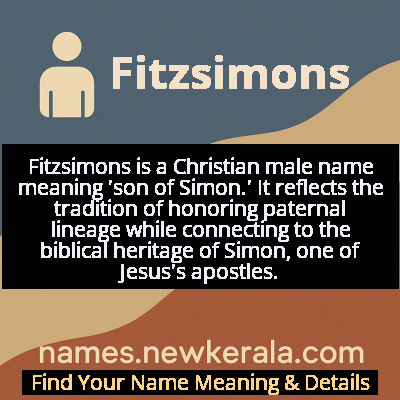Fitzsimons Name Meaning & Details
Origin, Popularity, Numerology Analysis & Name Meaning of Fitzsimons
Discover the origin, meaning, and cultural significance of the name FITZSIMONS. Delve into its historical roots and explore the lasting impact it has had on communities and traditions.
Name
Fitzsimons
Gender
Male
Origin
Christian
Lucky Number
6
Meaning of the Name - Fitzsimons
Fitzsimons is a Christian male name meaning 'son of Simon.' It reflects the tradition of honoring paternal lineage while connecting to the biblical heritage of Simon, one of Jesus's apostles.
Fitzsimons - Complete Numerology Analysis
Your Numerology Number
Based on Pythagorean Numerology System
Ruling Planet
Venus
Positive Nature
Harmonious, responsible, caring, and artistic.
Negative Traits
Overly idealistic, superficial, possessive, or jealous.
Lucky Colours
Pink, turquoise.
Lucky Days
Friday.
Lucky Stones
Diamond, turquoise.
Harmony Numbers
2, 3, 9.
Best Suited Professions
Artists, musicians, teachers, healthcare workers.
What People Like About You
Warmth, nurturing nature, artistic flair.
Famous People Named Fitzsimons
Thomas Fitzsimons
American Politician
Signatory of the United States Constitution and U.S. Representative from Pennsylvania
John Fitzsimons
Irish Businessman
Prominent Dublin merchant and philanthropist who established several charitable institutions
James Fitzsimons
Film Director
Academy Award-nominated director known for 'The Christmas Chronicles' and other family films
Patrick Fitzsimons
Irish Archbishop
Roman Catholic Archbishop of Dublin who played key role in Irish Catholic emancipation
Name Variations & International Equivalents
Click on blue names to explore their detailed meanings. Gray names with will be available soon.
Cultural & Historical Significance
The name carries echoes of Ireland's colonial past while also symbolizing the resilience and adaptation of Irish families through centuries of political and social change. Many Fitzsimons families maintained their Catholic faith during periods of religious persecution, making the name significant in the context of Irish Catholic identity and survival. In the American context, the name gained prominence through figures like Thomas Fitzsimons, one of only two Catholic signers of the U.S. Constitution, highlighting the name's connection to religious freedom and early American democracy.
Extended Personality Analysis
Individuals bearing the Fitzsimons name are often perceived as having strong leadership qualities and a deep sense of family loyalty, reflecting the name's patronymic origins. They typically exhibit determination and resilience, characteristics that may stem from the historical challenges faced by many Irish families carrying Norman-derived surnames. Fitzsimons are often seen as practical problem-solvers with good organizational skills, possibly influenced by the name's association with administrative and merchant classes throughout history.
Many display a blend of traditional values with progressive thinking, mirroring the name's journey from Norman aristocracy to integrated Irish identity. There's often a noted intellectual curiosity and appreciation for history and heritage among those with this surname, along with a strong work ethic and commitment to community that has been characteristic of the name's bearers across generations. The combination of Norman administrative tradition and Irish cultural resilience creates individuals who are both principled and adaptable, capable of navigating complex social situations while maintaining strong personal convictions.
Modern Usage & Popularity
In contemporary times, Fitzsimons continues as both a surname and occasionally as a distinctive given name, particularly in Irish diaspora communities. The name maintains moderate frequency in Ireland, especially in the Leinster region, and remains common among Irish-American and Irish-Australian populations. While not among the most popular surnames, it has seen stable usage with occasional spikes in interest during genealogy booms and heritage movements. Modern bearers of the name are found across various professions, with notable representation in law, education, and business. The name's distinctive 'Fitz' prefix gives it an aristocratic flair that many modern families appreciate, while its clear Irish origins maintain cultural connections for those of Irish heritage. Recent years have seen some parents choosing Fitzsimons as a first name to honor family history while giving their child a unique and meaningful name.
Symbolic & Spiritual Meanings
Symbolically, Fitzsimons represents heritage, lineage, and the blending of cultures. The 'Fitz' element symbolizes noble ancestry and historical prestige, while 'Simon' connects to biblical traditions and the concept of 'hearing' or 'listening' from its Hebrew roots. The name embodies the idea of family continuity and the importance of paternal lineage in Western naming traditions. It also symbolizes adaptation and survival, reflecting how Norman names became thoroughly Irish over centuries. The combination suggests someone who bridges traditions—honoring the past while engaging with the present. In a broader sense, the name represents the Irish experience of absorbing outside influences while maintaining distinct cultural identity, making it symbolic of cultural resilience and integration. The name carries connotations of faithful listening combined with noble action, creating a symbolic balance between contemplation and leadership.

